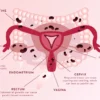Endometriosis is a condition that affects millions of women worldwide, often leaving a profound impact not only on daily life but also on fertility. It is estimated that 1 in 10 women of reproductive age has endometriosis, and up to 50% of women with infertility may have the condition. For those navigating the challenges of trying to conceive with endometriosis, understanding its effects and exploring fertility treatments like in vitro fertilization (IVF) can offer a path forward.
Understanding Endometriosis and Fertility – Endometriosis occurs when tissue similar to the uterine lining grows outside the uterus, causing inflammation, pain, and scarring. This misplaced tissue can affect fertility in several ways:
- Distorted Anatomy: Adhesions and scar tissue can alter the structure of reproductive organs, making it harder for eggs to travel through the fallopian tubes.
- Ovulatory Dysfunction: In some cases, endometriosis affects the ovaries, potentially disrupting normal ovulation.
- Inflammatory Environment: Chronic inflammation may impair egg quality, sperm function, and embryo development.
- Reduced Implantation Rates: Endometriosis can negatively impact the uterine lining, making it less receptive to embryo implantation.
The Role of IVF in Overcoming Fertility Challenges – IVF has become a beacon of hope for many individuals with endometriosis-related infertility. Here’s how it can help:
- Bypassing Fallopian Tubes: IVF involves retrieving eggs directly from the ovaries and fertilizing them in a lab, bypassing potential blockages or damage in the fallopian tubes.
- Controlled Environment: Fertilization occurs in a controlled environment, avoiding the inflammatory pelvic conditions that may hinder natural conception.
- Enhanced Monitoring: Fertility specialists closely monitor each step, from ovarian stimulation to embryo transfer, optimizing the chances of success.
- Tailored Protocols: For those with severe endometriosis, protocols can be customized to address individual challenges, improving outcomes.
Considering IVF: What to Expect – The decision to pursue IVF is deeply personal, often accompanied by a mix of hope and uncertainty. While success rates vary, studies have shown that women with mild to moderate endometriosis undergoing IVF have comparable pregnancy rates to those with other causes of infertility. However, severe endometriosis may lower success rates, making personalized treatment plans essential. Recent data suggests that IVF success rates for women with endometriosis range from 30% to 50% per cycle, depending on factors like age and the severity of the condition.
Hope and Support – Facing infertility due to endometriosis can feel isolating, but it’s important to remember that you are not alone. The journey may be challenging, but with the right support and medical guidance, the path to parenthood remains possible.
If you or someone you love is navigating fertility challenges related to endometriosis, seeking compassionate care from a knowledgeable specialist is the first step toward understanding the options and embracing hope for the future.
Dr Rami Wakim



